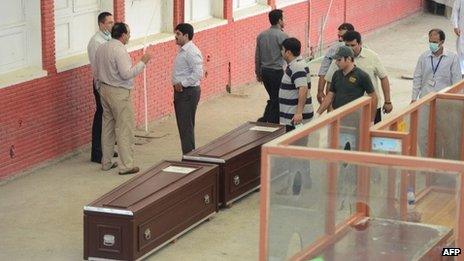Nanga Parbat: 'Taliban mastermind' held over climber murders
- Published

Shortly after the attack, the Pakistani Taliban said that the new faction had been set up to target foreigners
Pakistani police have arrested the suspected Taliban mastermind of the attack which killed 10 foreign climbers and their local guide in the Himalayas earlier this year, officials say.
Officials said Qaribullah, a former local Taliban chief, was detained with three others in Gilgit-Baltistan.
The climbers were forced to kneel and were then shot in the head at Nanga Parbat base camp last June.
The Taliban said they were killed by a faction set up to target foreigners.
The chief secretary of the Gilgit-Baltistan region said that the four men were detained for suspected involvement in various crimes, including the Nanga Parbat killings as well as a deadly attack on police in the town of Chilas last month.
The carefully choreographed assault was the worst attack on foreigners in Pakistan in a decade.
Part of the Himalayan Range, Nanga Parbat, the world's ninth highest mountain at 8,126m (26,660ft) above sea level, is popular with trekkers and mountaineers, especially during June and July.
Carefully choreographed
The nationalities of the foreign victims were identified as American, Chinese, Ukrainian, Slovakian, Lithuanian and Nepali. One Pakistani porter also died and officials believe he may have been targeted because he was a Shia Muslim.
Shortly after the attack, the Pakistani Taliban said that the new faction, set up to target foreigners and named in local media reports as Junoodul Hifsa, was formed to take revenge for drone attacks in Pakistan.
At least 15 gunmen dressed in the uniform of local security forces carried out the attack.
Even though it took place at base camp, this was at a height of 4,200m (13,779 ft) and the attackers would have had to travel for at least 18 hours by foot or by mule.
The attackers forced two local guides to take them to the base camp. Once they reached their destination, they rounded up the foreign climbers and staff, took passports and money, destroyed mobile phones, blindfolded them and forced them to kneel.
The gunmen separated and tied up the local Pakistani staff and told them not to attempt to raise the alarm until morning, a local official said. The attackers are believed to have left in the early hours of the next morning.
The Gilgit-Baltistan region, where it is located, is famous for its natural beauty and has been spared most of the violence that has wracked Pakistan, along with other parts of Pakistan's far north.
- Published25 June 2013
- Published23 June 2013
- Published12 August 2022
- Published15 March